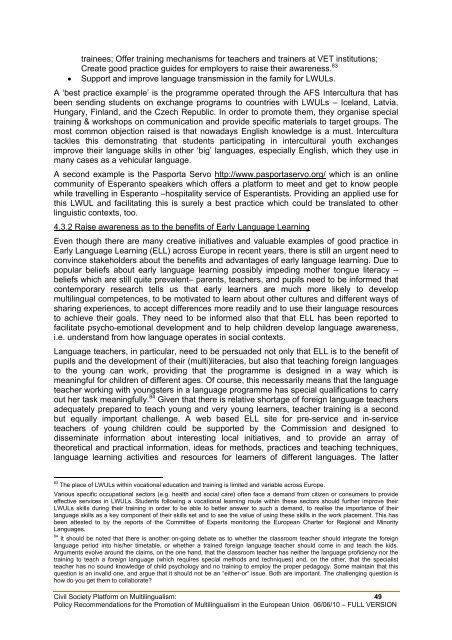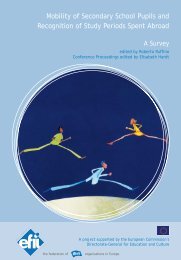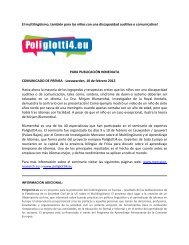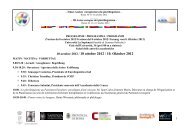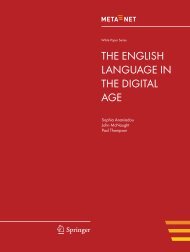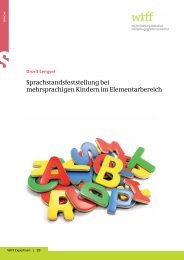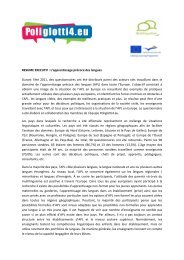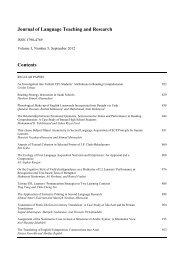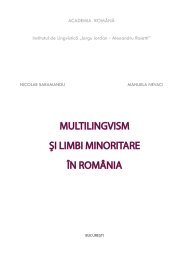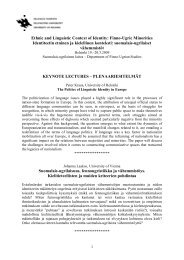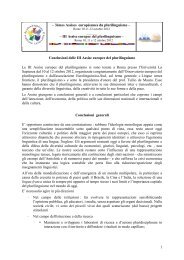FULL VERSION - European Commission - Europa
FULL VERSION - European Commission - Europa
FULL VERSION - European Commission - Europa
Create successful ePaper yourself
Turn your PDF publications into a flip-book with our unique Google optimized e-Paper software.
trainees; Offer training mechanisms for teachers and trainers at VET institutions;Create good practice guides for employers to raise their awareness. 83 Support and improve language transmission in the family for LWULs.A ‘best practice example’ is the programme operated through the AFS Intercultura that hasbeen sending students on exchange programs to countries with LWULs – Iceland, Latvia,Hungary, Finland, and the Czech Republic. In order to promote them, they organise specialtraining & workshops on communication and provide specific materials to target groups. Themost common objection raised is that nowadays English knowledge is a must. Interculturatackles this demonstrating that students participating in intercultural youth exchangesimprove their language skills in other ‘big’ languages, especially English, which they use inmany cases as a vehicular language.A second example is the Pasporta Servo http://www.pasportaservo.org/ which is an onlinecommunity of Esperanto speakers which offers a platform to meet and get to know peoplewhile travelling in Esperanto –hospitality service of Esperantists. Providing an applied use forthis LWUL and facilitating this is surely a best practice which could be translated to otherlinguistic contexts, too.4.3.2 Raise awareness as to the benefits of Early Language LearningEven though there are many creative initiatives and valuable examples of good practice inEarly Language Learning (ELL) across Europe in recent years, there is still an urgent need toconvince stakeholders about the benefits and advantages of early language learning. Due topopular beliefs about early language learning possibly impeding mother tongue literacy –beliefs which are still quite prevalent– parents, teachers, and pupils need to be informed thatcontemporary research tells us that early learners are much more likely to developmultilingual competences, to be motivated to learn about other cultures and different ways ofsharing experiences, to accept differences more readily and to use their language resourcesto achieve their goals. They need to be informed also that that ELL has been reported tofacilitate psycho-emotional development and to help children develop language awareness,i.e. understand from how language operates in social contexts.Language teachers, in particular, need to be persuaded not only that ELL is to the benefit ofpupils and the development of their (multi)literacies, but also that teaching foreign languagesto the young can work, providing that the programme is designed in a way which ismeaningful for children of different ages. Of course, this necessarily means that the languageteacher working with youngsters in a language programme has special qualifications to carryout her task meaningfully. 84 Given that there is relative shortage of foreign language teachersadequately prepared to teach young and very young learners, teacher training is a secondbut equally important challenge. A web based ELL site for pre-service and in-serviceteachers of young children could be supported by the <strong>Commission</strong> and designed todisseminate information about interesting local initiatives, and to provide an array oftheoretical and practical information, ideas for methods, practices and teaching techniques,language learning activities and resources for learners of different languages. The latter83The place of LWULs within vocational education and training is limited and variable across Europe.Various specific occupational sectors (e.g. health and social care) often face a demand from citizen or consumers to provideeffective services in LWULs. Students following a vocational learning route within these sectors should further improve theirLWULs skills during their training in order to be able to better answer to such a demand, to realise the importance of theirlanguage skills as a key component of their skills set and to see the value of using these skills in the work placement. This hasbeen attested to by the reports of the Committee of Experts monitoring the <strong>European</strong> Charter for Regional and MinorityLanguages.84It should be noted that there is another on-going debate as to whether the classroom teacher should integrate the foreignlanguage period into his/her timetable, or whether a trained foreign language teacher should come in and teach the kids.Arguments evolve around the claims, on the one hand, that the classroom teacher has neither the language proficiency nor thetraining to teach a foreign language (which requires special methods and techniques) and, on the other, that the specialistteacher has no sound knowledge of child psychology and no training to employ the proper pedagogy. Some maintain that thisquestion is an invalid one, and argue that it should not be an “either-or” issue. Both are important. The challenging question ishow do you get them to collaborate?Civil Society Platform on Multilingualism: 49Policy Recommendations for the Promotion of Multilingualism in the <strong>European</strong> Union 06/06/10 – <strong>FULL</strong> <strong>VERSION</strong>


